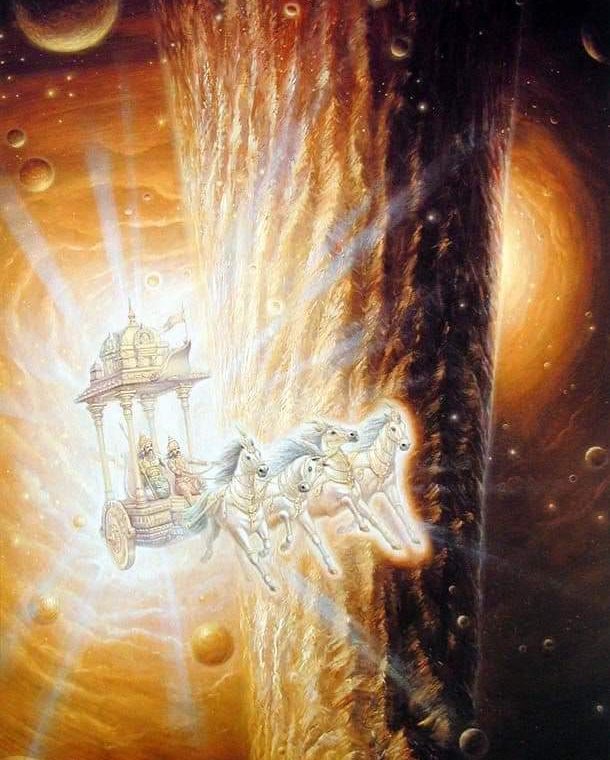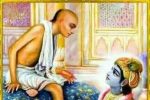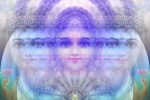NAME 83
Kṛtiḥ कृतिः
Kṛti means the Creator. With reference to the previous nāma, this nāma should be interpreted as the One who creates the rules of dharma-s. Dharma is the customary observance of certain conducts prescribed by śāstra-s. Śāstra-s are religious treatises. There are two types of śāstra-s. The first one is prescribed based on the teachings of Veda-s. The second one is of recent origin. The first one is to be meticulously followed. This nāma says that Viṣṇu is the creator of these śāstra-s. After all, Vedas are His breath and He created these śāstra-s from Vedic teachings.
But, what are the benefits of following these śāstra-s? They form the foundation for one’s spiritual journey. When śāstra-s say do this and don’t do this, they purify the mind. Mind is the arena where the ultimate realisation of the Brahman takes place.
One who is the cause of the virtuous act of His devotees. In the previous Nama we saw that Bhagavan has great gratitude for the good acts of His devotees. Through the current Nama it is pointed out that in reality Bhagavan is really the cause behind the good deeds, and all we can and should do is practice pure and sincere devotion. The One, who is the very dynamism behind all activities. He is the Inevitability behind the result of actions. He is called Krutir because it is He who visits to bless the good and to punish the evil; in short; He is the One who rewards all our actions.
Kritih – He is the force behind all actions
He is responsible for the actions of all. He is the Cause of Causes.
We may think we are the Kartaa or the Doer but it is all His Kriti, triggering the inner force of action. The light bulb which glows is the Karta but the glow is actually the Kriti of the electricity which is flowing through the bulb. Without his grace not even an atom can move!
८३. ॐ कृतये नमः |
83. OM Kr̥taye Namaḥ
(83) Kritih -The One, who is the very dynamism behind all activities. He is the Inevitability behind the result of actions. He is called Kritih because it is He who visits to bless the good and to punish the evil; in short; He is the One who rewards all our actions.
Kr̥ti means effort. Or the act itself. Or being soul of all, He is considered as the basis of every act.
Bhagavad Gītā – Chapter 3
Na hi kaścitkṣaṇamapi jātu tiṣṭhatyakarmakr̥t,
Kāryate hyavaśaḥ karma sarvaḥ prakr̥tijairguṇaiḥ. (5)
:: भगवद्गीता – कर्म योग ::
न हि कश्चित्क्षणमपि जातु तिष्ठत्यकर्मकृत् ।
कार्यते ह्यवशः कर्म सर्वः प्रकृतिजैर्गुणैः ॥ ५ ॥
No one ever remains even for a moment without doing work. For all are made to work under compulsion by the guṇās born of Nature.
INTERPRETATION GUIDED BY SANT VANI (WORDS OF SAINTS)
Kṛtiḥ
The one in the form of effort.
Īśvara in the form of action, is called Kṛti. Not only is He the knower of the karma-phala, the results of action; He is also in the form of Kṛti, action, because He is in the form of sādhya-sādhana-sambandha, the law that determines the connection between the result and the action.
He who is the the real mover behind all actions. The dynamism behind human effort and the act/effort itself/as well. He who decides the fruits of actions and rewards all action (Śaṅkara). He ‘chooses’ the person he wants to pull out of the world of material action and sets them on the virtuous path (Parāsara Battar).
Just as the Ocean is behind and present in each wave, so also “He” is present in every action and effort that we undertake – how and what we choose to do is therefore important. This name also dovetails perfectly with the previous name: Kṛtajñaḥ, he who is grateful to his devotees for even the small things that they do for him.
Does this mean that just because “He” is behind every action of ours, we are free to do what we please? The answer is obviously No. As Parāsara Battar clarifies, “He” sets us upon the virtuous path” – and he will do so when we accept his as our companion and as the indwelling witness who sees everything we think, feel and do – There is no place that he is not there and even if we think we may get away from the prying eyes of the world, we can’t get away from him and the little voice that speaks from within – It is this thought that should keep us on the path that leads to him.
There are of course the grand exceptions who have attained to the highest state by opposing Hari himself – specifically the brothers Jaya and Vijaya who were born three times as Hiraṇyākṣa & Hiraṇyakaśipu in Satyayuga; Rāvaṇa & Kumbhakarṇa in Tretāyuga; Dantavakra and Śiśupāla in Dvāparayuga after they were cursed by the four Sanatkumāras. Viṣṇu himself came three times to deliver them from the curse and confer Mokṣā – when you think of it, these two were the gatekeepers to Vaikuṇṭha – they were that close to final realization and sublimation within the Supreme Being. One small error in judgement and they had to be born three times across three different yugas – That should tell us where we stand and how careful we ought to be.
In the Sabha Parva of the Mahabharata where Śiśupāla-vadha occurs, Pitamah Bhīṣma prevents Bhīma from attacking Śiśupāla because Bhīṣma knows that Śiśupāla is destined to die at the hands of Kṛṣṇa and recounts the entire story to Bhīma. Even as Śiśupāla is on a roll, reeling out insults and nearing that mark of 100 insults that would signal the end of his life and deliverance back to Vaikuṇṭha, the first few names he uses are Janārdana and Madhusūdana! Kṛṣṇa sat through the 100 insults with an enigmatic smile playing on his face, for he knew that finally his beloved ‘gatekeeper’ was coming back to his source.
Read what the all-knowing Bhīṣma tells Bhīma:
“This Śiśupāla is not destined to be killed by you. The force, under which the King of Chedi boasts so foolishly, is scarcely of his own, but the Lord of the universe. O Bhima, what king is there who would dare abuse me as this wretch, already possessed by death, has done today. This king of Chedi is without doubt under the influence of Lord Hari’s energy. And surely the Lord desires to take him back to Vaikuntha. Due to the Lord’s influence, Shishupala roars like a lion caring little for all kings present”.
Who determines that this is the means to achieve this end? If both the hands are brought together to clap, with a certain momentum, a sound is produced. If both the hands are brought together gently, then there is ‘namaste’. The action is the same, still there is a big difference. A one year child, who has just started to discover the range of his energy and movements, will find it difficult to put his hands for a Namaste as compared to the same child, a year later. Who determines that there should be a sound when there is a clap? Who determines which action is right and which is wrong? Where there is the given in terms of all the actions possible, there is a giver of the result and He gives it according to the law or mandate. So the Lord is the very mandate itself and that is the nature of Īśvara. Dharma is the nature of Īśvara and hence one cannot go against dharma.
Someone asked Alice (in wonderland) for directions. Alice posed a question, “But, where do you want to go?”. Shrugging his shoulders, the creature said, “I don’t know”. Alice sighed, “Oh, then it does not matter.” Clarity of where I am headed, clarity in my priorities is non negotiable, if I want to have a fulfilling life. There are means and ends, causes and effects, actions and reactions. For every achievement there is a right means and a wrong means. All these are given.
If, in choosing means and ends, I follow what we call dharma, ethical norms which are
commonly accepted by all of us then there is no problem. By common sense, everyone knows dharma, everyone has a value structure.
Thus, there is a universal value structure. Śrī Kṛṣṇa says, ‘I am manifest in the form of dharma. I am the giver of the results of action. I am the Karma phala and I am in the form of Kṛti, that is, in the form of sādhya-sādhana-sambandha,’ All this is possible only when we understand that where there is the given, there is the giver in the form of the material cause. The Lord is everything. Every sambandha, every relationship, every sequence is the structure. The whole thing is Īśvara and He is untouched by anything. Therefore, the Lord is Kṛti.
Many people helplessly say, ‘they have no choice’. How is that possible? Clearly, they have not discovered their relative freedom that comes from exercising the many powers given to them. Due to the grace of Īśvara, every individual is endowed with an icchā-śakti, a power to desire. With his jñāna-śakti, he plans to attain what he desires and with his kriyā-śakti, he acts accordingly. Therefore, this gain is preceded by effort and right action which is in keeping with dharma. There can be no individual who is completely helpless. And due to his effort, he gains the desired results. Even a person who is in coma has icchā-śakti. That is why, we hear of so many people recovering from a situation of coma, when everyone else had given up hope. This puruṣa-prayatna, effort and the kriyā, the action is called kṛti.
Everything is Īśvara. Sarvātmatvāt, as He is the reality of everything, everything is nothing but the Lord alone. He is the ādhāra, basis of everything beginning with desire till the desired end is got. That is pointed out by the name Kṛti.
Bhagavan being sarvajna, should logically know the choice we will make..And hence the question is, is our free will really free? Let’s look at this from two standpoints:
From Bhagavan‘s standpoint, Bhagavan knows the choice we will make. How? Just like a satellite looking at the flow of Ganga, from Gomukh to Gangasagar, sees things at once. The journey of the river may have a past, present and future. Not so, for the satellite.
From the standpoint of the individual, free will can be understood when we look at its seeming opposite, ‘Absence of free will/ choice, in other words, being programmed, as we see in animals. Free will manifests in human beings, in every situation, in the choice ‘to do, not to do or do differently. To be or nor to be, is not the question. How to be, where to be determines our choice of haircuts, jobs and even the color of our passport. What about destiny then? The effects of our actions manifesting as situations and patterns in our life. Life is a dynamic balance of free will and destiny.
Free will is not absolute. It is relative and has a certain scope of operation. Yet, it is free enough to help me discover that I am that absolute reality.
To come to a Guru, was your prārabdha. What you do with it is your free will. And if we really look at it, there are hundreds and thousands who have come in contact with a true Guru. Yet some people continued to be devotees, some chose to be long distance students, some chose to be full time students and some chose to only read his books and act and yet others who read and still may not imbibe the teachings.
Quoting the words of Swamiji from:
https://os.me/destiny-or-free-will-what-do-you-choose/
“In my view, the question of destiny or free will is a philosophical problem and has little to do with our real lives.
This question has no meaning to begin with. Just because we can string together some words and put an interrogative mark at the end does not mean we have formed a valid question. For one thing, we can neither prove nor disprove either destiny or free will. When you take one as the sole truth, you’ll find plenty of contradictory evidence.
With destiny, we are assuming that something that is bound to happen will happen no matter what. And the concept of free will states that our life happens to us at our discretion, that we make free choices uninfluenced by anything called karma, destiny or whatever. The truth is somewhere in between. Do you still feel to choose-Destiny or Free Will?
At any rate, I prefer to look at life differently. In my world, from my perspective, it’s not about what is destiny or free will-predestined versus what isn’t (we can’t reasonably ascertain that). It’s more about what is or isn’t in our control. For better or worse, once we take an action, we just never know what else it may lead to. We don’t even have to go very far into our history.
Simply examine some of the greatest scientific discoveries of the past 200 years. While there’s no doubt that those brilliant scientists and inventors discovered many great things laboriously, the fact remains that often when deeply engrossed in working towards something, they chanced upon something totally different, a completely unexpected result. And that’s the keyword: chance rather than destiny or free will.
Instead of thinking of destiny or free will, begin with the assumption that you can transform your life, you can master yourself and you can write your future. Once you set your mind, give your everything to make it happen. Whatever be the outcome, the journey itself becomes every bit worthwhile. Why live any other way?”
Recommended reading with this name:



